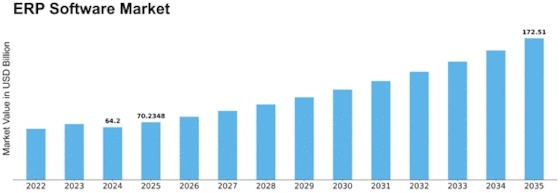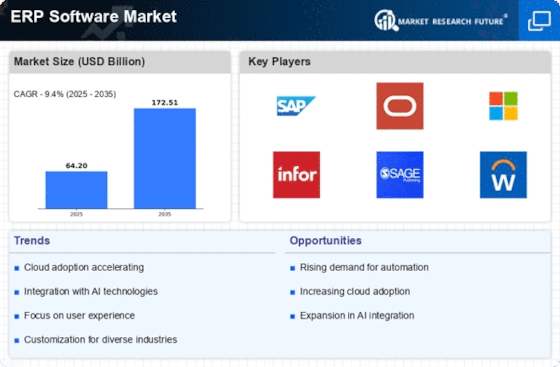On-Premises
Cloud-Based
Hybrid
Small Enterprises
Medium Enterprises
Large Enterprises
Financial Management
Supply Chain Management
Human Resource Management
Customer Relationship Management
Manufacturing
Retail
Healthcare
Education
North America
Europe
South America
Asia Pacific
Middle East and Africa
North America Outlook (USD Billion, 2019-2035)
ERP Software Market by Deployment Model Type
On-Premises
Cloud-Based
Hybrid
ERP Software Market by Business Size Type
Small Enterprises
Medium Enterprises
Large Enterprises
ERP Software Market by Functionality Type
Financial Management
Supply Chain Management
Human Resource Management
Customer Relationship Management
ERP Software Market by Industry Type
Manufacturing
Retail
Healthcare
Education
ERP Software Market by Regional Type
US
Canada
US Outlook (USD Billion, 2019-2035)
ERP Software Market by Deployment Model Type
On-Premises
Cloud-Based
Hybrid
ERP Software Market by Business Size Type
Small Enterprises
Medium Enterprises
Large Enterprises
ERP Software Market by Functionality Type
Financial Management
Supply Chain Management
Human Resource Management
Customer Relationship Management
ERP Software Market by Industry Type
Manufacturing
Retail
Healthcare
Education
CANADA Outlook (USD Billion, 2019-2035)
ERP Software Market by Deployment Model Type
On-Premises
Cloud-Based
Hybrid
ERP Software Market by Business Size Type
Small Enterprises
Medium Enterprises
Large Enterprises
ERP Software Market by Functionality Type
Financial Management
Supply Chain Management
Human Resource Management
Customer Relationship Management
ERP Software Market by Industry Type
Manufacturing
Retail
Healthcare
Education
Europe Outlook (USD Billion, 2019-2035)
ERP Software Market by Deployment Model Type
On-Premises
Cloud-Based
Hybrid
ERP Software Market by Business Size Type
Small Enterprises
Medium Enterprises
Large Enterprises
ERP Software Market by Functionality Type
Financial Management
Supply Chain Management
Human Resource Management
Customer Relationship Management
ERP Software Market by Industry Type
Manufacturing
Retail
Healthcare
Education
ERP Software Market by Regional Type
Germany
UK
France
Russia
Italy
Spain
Rest of Europe
GERMANY Outlook (USD Billion, 2019-2035)
ERP Software Market by Deployment Model Type
On-Premises
Cloud-Based
Hybrid
ERP Software Market by Business Size Type
Small Enterprises
Medium Enterprises
Large Enterprises
ERP Software Market by Functionality Type
Financial Management
Supply Chain Management
Human Resource Management
Customer Relationship Management
ERP Software Market by Industry Type
Manufacturing
Retail
Healthcare
Education
UK Outlook (USD Billion, 2019-2035)
ERP Software Market by Deployment Model Type
On-Premises
Cloud-Based
Hybrid
ERP Software Market by Business Size Type
Small Enterprises
Medium Enterprises
Large Enterprises
ERP Software Market by Functionality Type
Financial Management
Supply Chain Management
Human Resource Management
Customer Relationship Management
ERP Software Market by Industry Type
Manufacturing
Retail
Healthcare
Education
FRANCE Outlook (USD Billion, 2019-2035)
ERP Software Market by Deployment Model Type
On-Premises
Cloud-Based
Hybrid
ERP Software Market by Business Size Type
Small Enterprises
Medium Enterprises
Large Enterprises
ERP Software Market by Functionality Type
Financial Management
Supply Chain Management
Human Resource Management
Customer Relationship Management
ERP Software Market by Industry Type
Manufacturing
Retail
Healthcare
Education
RUSSIA Outlook (USD Billion, 2019-2035)
ERP Software Market by Deployment Model Type
On-Premises
Cloud-Based
Hybrid
ERP Software Market by Business Size Type
Small Enterprises
Medium Enterprises
Large Enterprises
ERP Software Market by Functionality Type
Financial Management
Supply Chain Management
Human Resource Management
Customer Relationship Management
ERP Software Market by Industry Type
Manufacturing
Retail
Healthcare
Education
ITALY Outlook (USD Billion, 2019-2035)
ERP Software Market by Deployment Model Type
On-Premises
Cloud-Based
Hybrid
ERP Software Market by Business Size Type
Small Enterprises
Medium Enterprises
Large Enterprises
ERP Software Market by Functionality Type
Financial Management
Supply Chain Management
Human Resource Management
Customer Relationship Management
ERP Software Market by Industry Type
Manufacturing
Retail
Healthcare
Education
SPAIN Outlook (USD Billion, 2019-2035)
ERP Software Market by Deployment Model Type
On-Premises
Cloud-Based
Hybrid
ERP Software Market by Business Size Type
Small Enterprises
Medium Enterprises
Large Enterprises
ERP Software Market by Functionality Type
Financial Management
Supply Chain Management
Human Resource Management
Customer Relationship Management
ERP Software Market by Industry Type
Manufacturing
Retail
Healthcare
Education
REST OF EUROPE Outlook (USD Billion, 2019-2035)
ERP Software Market by Deployment Model Type
On-Premises
Cloud-Based
Hybrid
ERP Software Market by Business Size Type
Small Enterprises
Medium Enterprises
Large Enterprises
ERP Software Market by Functionality Type
Financial Management
Supply Chain Management
Human Resource Management
Customer Relationship Management
ERP Software Market by Industry Type
Manufacturing
Retail
Healthcare
Education
APAC Outlook (USD Billion, 2019-2035)
ERP Software Market by Deployment Model Type
On-Premises
Cloud-Based
Hybrid
ERP Software Market by Business Size Type
Small Enterprises
Medium Enterprises
Large Enterprises
ERP Software Market by Functionality Type
Financial Management
Supply Chain Management
Human Resource Management
Customer Relationship Management
ERP Software Market by Industry Type
Manufacturing
Retail
Healthcare
Education
ERP Software Market by Regional Type
China
India
Japan
South Korea
Malaysia
Thailand
Indonesia
Rest of APAC
CHINA Outlook (USD Billion, 2019-2035)
ERP Software Market by Deployment Model Type
On-Premises
Cloud-Based
Hybrid
ERP Software Market by Business Size Type
Small Enterprises
Medium Enterprises
Large Enterprises
ERP Software Market by Functionality Type
Financial Management
Supply Chain Management
Human Resource Management
Customer Relationship Management
ERP Software Market by Industry Type
Manufacturing
Retail
Healthcare
Education
INDIA Outlook (USD Billion, 2019-2035)
ERP Software Market by Deployment Model Type
On-Premises
Cloud-Based
Hybrid
ERP Software Market by Business Size Type
Small Enterprises
Medium Enterprises
Large Enterprises
ERP Software Market by Functionality Type
Financial Management
Supply Chain Management
Human Resource Management
Customer Relationship Management
ERP Software Market by Industry Type
Manufacturing
Retail
Healthcare
Education
JAPAN Outlook (USD Billion, 2019-2035)
ERP Software Market by Deployment Model Type
On-Premises
Cloud-Based
Hybrid
ERP Software Market by Business Size Type
Small Enterprises
Medium Enterprises
Large Enterprises
ERP Software Market by Functionality Type
Financial Management
Supply Chain Management
Human Resource Management
Customer Relationship Management
ERP Software Market by Industry Type
Manufacturing
Retail
Healthcare
Education
SOUTH KOREA Outlook (USD Billion, 2019-2035)
ERP Software Market by Deployment Model Type
On-Premises
Cloud-Based
Hybrid
ERP Software Market by Business Size Type
Small Enterprises
Medium Enterprises
Large Enterprises
ERP Software Market by Functionality Type
Financial Management
Supply Chain Management
Human Resource Management
Customer Relationship Management
ERP Software Market by Industry Type
Manufacturing
Retail
Healthcare
Education
MALAYSIA Outlook (USD Billion, 2019-2035)
ERP Software Market by Deployment Model Type
On-Premises
Cloud-Based
Hybrid
ERP Software Market by Business Size Type
Small Enterprises
Medium Enterprises
Large Enterprises
ERP Software Market by Functionality Type
Financial Management
Supply Chain Management
Human Resource Management
Customer Relationship Management
ERP Software Market by Industry Type
Manufacturing
Retail
Healthcare
Education
THAILAND Outlook (USD Billion, 2019-2035)
ERP Software Market by Deployment Model Type
On-Premises
Cloud-Based
Hybrid
ERP Software Market by Business Size Type
Small Enterprises
Medium Enterprises
Large Enterprises
ERP Software Market by Functionality Type
Financial Management
Supply Chain Management
Human Resource Management
Customer Relationship Management
ERP Software Market by Industry Type
Manufacturing
Retail
Healthcare
Education
INDONESIA Outlook (USD Billion, 2019-2035)
ERP Software Market by Deployment Model Type
On-Premises
Cloud-Based
Hybrid
ERP Software Market by Business Size Type
Small Enterprises
Medium Enterprises
Large Enterprises
ERP Software Market by Functionality Type
Financial Management
Supply Chain Management
Human Resource Management
Customer Relationship Management
ERP Software Market by Industry Type
Manufacturing
Retail
Healthcare
Education
REST OF APAC Outlook (USD Billion, 2019-2035)
ERP Software Market by Deployment Model Type
On-Premises
Cloud-Based
Hybrid
ERP Software Market by Business Size Type
Small Enterprises
Medium Enterprises
Large Enterprises
ERP Software Market by Functionality Type
Financial Management
Supply Chain Management
Human Resource Management
Customer Relationship Management
ERP Software Market by Industry Type
Manufacturing
Retail
Healthcare
Education
South America Outlook (USD Billion, 2019-2035)
ERP Software Market by Deployment Model Type
On-Premises
Cloud-Based
Hybrid
ERP Software Market by Business Size Type
Small Enterprises
Medium Enterprises
Large Enterprises
ERP Software Market by Functionality Type
Financial Management
Supply Chain Management
Human Resource Management
Customer Relationship Management
ERP Software Market by Industry Type
Manufacturing
Retail
Healthcare
Education
ERP Software Market by Regional Type
Brazil
Mexico
Argentina
Rest of South America
BRAZIL Outlook (USD Billion, 2019-2035)
ERP Software Market by Deployment Model Type
On-Premises
Cloud-Based
Hybrid
ERP Software Market by Business Size Type
Small Enterprises
Medium Enterprises
Large Enterprises
ERP Software Market by Functionality Type
Financial Management
Supply Chain Management
Human Resource Management
Customer Relationship Management
ERP Software Market by Industry Type
Manufacturing
Retail
Healthcare
Education
MEXICO Outlook (USD Billion, 2019-2035)
ERP Software Market by Deployment Model Type
On-Premises
Cloud-Based
Hybrid
ERP Software Market by Business Size Type
Small Enterprises
Medium Enterprises
Large Enterprises
ERP Software Market by Functionality Type
Financial Management
Supply Chain Management
Human Resource Management
Customer Relationship Management
ERP Software Market by Industry Type
Manufacturing
Retail
Healthcare
Education
ARGENTINA Outlook (USD Billion, 2019-2035)
ERP Software Market by Deployment Model Type
On-Premises
Cloud-Based
Hybrid
ERP Software Market by Business Size Type
Small Enterprises
Medium Enterprises
Large Enterprises
ERP Software Market by Functionality Type
Financial Management
Supply Chain Management
Human Resource Management
Customer Relationship Management
ERP Software Market by Industry Type
Manufacturing
Retail
Healthcare
Education
REST OF SOUTH AMERICA Outlook (USD Billion, 2019-2035)
ERP Software Market by Deployment Model Type
On-Premises
Cloud-Based
Hybrid
ERP Software Market by Business Size Type
Small Enterprises
Medium Enterprises
Large Enterprises
ERP Software Market by Functionality Type
Financial Management
Supply Chain Management
Human Resource Management
Customer Relationship Management
ERP Software Market by Industry Type
Manufacturing
Retail
Healthcare
Education
MEA Outlook (USD Billion, 2019-2035)
ERP Software Market by Deployment Model Type
On-Premises
Cloud-Based
Hybrid
ERP Software Market by Business Size Type
Small Enterprises
Medium Enterprises
Large Enterprises
ERP Software Market by Functionality Type
Financial Management
Supply Chain Management
Human Resource Management
Customer Relationship Management
ERP Software Market by Industry Type
Manufacturing
Retail
Healthcare
Education
ERP Software Market by Regional Type
GCC Countries
South Africa
Rest of MEA
GCC COUNTRIES Outlook (USD Billion, 2019-2035)
ERP Software Market by Deployment Model Type
On-Premises
Cloud-Based
Hybrid
ERP Software Market by Business Size Type
Small Enterprises
Medium Enterprises
Large Enterprises
ERP Software Market by Functionality Type
Financial Management
Supply Chain Management
Human Resource Management
Customer Relationship Management
ERP Software Market by Industry Type
Manufacturing
Retail
Healthcare
Education
SOUTH AFRICA Outlook (USD Billion, 2019-2035)
ERP Software Market by Deployment Model Type
On-Premises
Cloud-Based
Hybrid
ERP Software Market by Business Size Type
Small Enterprises
Medium Enterprises
Large Enterprises
ERP Software Market by Functionality Type
Financial Management
Supply Chain Management
Human Resource Management
Customer Relationship Management
ERP Software Market by Industry Type
Manufacturing
Retail
Healthcare
Education
REST OF MEA Outlook (USD Billion, 2019-2035)
ERP Software Market by Deployment Model Type
On-Premises
Cloud-Based
Hybrid
ERP Software Market by Business Size Type
Small Enterprises
Medium Enterprises
Large Enterprises
ERP Software Market by Functionality Type
Financial Management
Supply Chain Management
Human Resource Management
Customer Relationship Management
ERP Software Market by Industry Type
Manufacturing
Retail
Healthcare
Education




















Leave a Comment